Cycle of screenings and debates: "(Counter-)cinematographic memories of conflicts in mediterranean Europe": 2023-2024 edition
In this cycle of screenings followed by discussions, we will look at films as documents and actors in the historiographical debates and battles specific to Central, Eastern and Balkan Europe under communist or authoritarian regimes and after their fall.
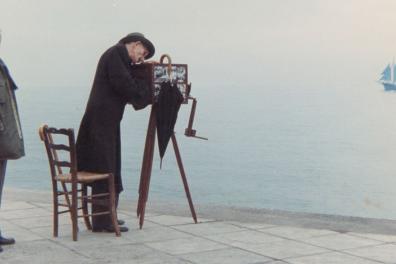
Films will be shown in their original version with French subtitles (or, failing that, in English), and screenings will be followed by discussion-debates in the presence of the director, a member of the film crew or a specialist in the field. The screenings can be of different formats (one or more films, feature-length fiction films, animated films, documentaries and experimental shorts, fiction or documentary).
This cycle is aimed at students and the general public. Free admission.
Design and organization: Anne Madelain (Inalco, centre de recherche Europes-Eurasie-CREE) and Naïma Berkane (Sorbonne Université, Eur'Orbem)
Location: auditorium de l'Inalco, PLC - 65, rue des Grands Moulins - 75013 Paris
Programme du cycle 2023-2024
Friday October 6, 2023 - 17:00 - 21:30
Le Regard d'Ulysse
Theo Angelopoulos, Greece, 1995, 169 mn, VOSTFR. Productions: Greek Film Centre, Mega Channel, Paradis Film, La Sept Cinéma, La Générale d'Images, distribution: StudioCanal
An exiled Greek filmmaker returns to his homeland (in northern Greece, near Thessalonica), in search of the original reels of the first film made in the Balkans by the Manakis brothers in the early 20th century. This quest took him through various Balkan countries after the fall of communism, from Bulgaria to the nascent Republic of Macedonia, ending in Sarajevo during the Bosnian-Herzegovinian war in a disintegrating Yugoslavia. He finally arrives under fire during the siege of Sarajevo, where he discovers the precious reels preserved by an old man, a cinema projectionist, who is trying as best he can to preserve the cinematic heritage of his exploding country.
Projection followed by a discussion moderated by Naïma Berkane (Eur'ORBEM, Sorbonne Université).
A debate on this same theme will take place online, on Friday, October 20, from 7 to 8:30 pm: "Talk about Ulysses' Gaze"organized by Federal Rural University of Rio de Janeiro, Cinémathèque MAM Rio, Kinoklub Zagreb, Les Orangeries de Bierbais, Inalco, CREE and Eur'ORBEM. With Pedro Hussak (Professor of philosophy and aesthetics), Petra Belc (PhD specialist in experimental cinema), Ivana Momčilović (playwright, PhD In One Night/Collective E-I-Migrative Art/Edicija Jugoslavija) and Naïma Berkane (PhD student on Yugoslav modernist cinema).
For further information, write to View e-mail
Monday, October 23, 2023 - 18:00 - 20:30
Piran Pirano
Goran Vojnović, Slovenia, 2010, 101 mins. With Boris Cavazza, Mustafa Nadarević, Nina Ivanišin, Moamer Kasumović, Francesco Borchi. Genre: comedy-drama. Production: Ars media
The quest for a lost home: Piran - Pirano is a film about the intersecting destinies of three lives. The Italian Antonio, the Bosnian Veljko and the Slovenian Anica experienced the Second World War as children, and were each victims in their own way. This shared experience, filled with fear, despair, but also love and unspeakable feelings, resurfaces fifty years later when Antonio decides to return to Piran, a small town on the Slovenian coast, before he dies.
The film was translated by students from Inalco's Slovenian section, Nicolas Brunot and Efstatia Bekiari, under the guidance of their teachers Kaja Dolar and Petra Seitl
Reading and subtitling: Pia Zarnik
Screening followed by a discussion moderated by Samuel Julien, translator and lecturer at Inalco and Anne Madelain, lecturer at Inalco.
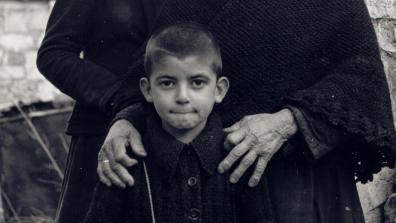
Friday, February 9, 2024 from 17:00 - 21:00
Days of 1944
Session of two films introduced and commented by Joëlle Dalègre (Inalco) and Nicolas Pitsos (BULAC)
June 1944. Just a few months before the Liberation, the German occupation forces, have just perpetrated a massacre in Distomo, a village in central Greece, in reprisal for an attack by Greek resistance fighters ('andartes'). Argyris Sfountouris lost his parents and was orphaned and taken in by the Swiss. Throughout his life, he was committed to human rights and to ensuring that the past was not forgotten. A few months later, in December 1944, the Battle of Athens took place, pitting government forces supported by the British army against Communist fighters following a brutal crackdown on a peaceful demonstration outside Parliament. This was the first sequence in a civil war that plunged Greece into a devastating conflict, ending in 1949 and leaving the country deeply divided.
This screening brings together two documentary films looking back at these events in contemporary Greek history, set within a broader history of the Balkans and the European continent under the Occupation and at the end of the Second World War.
- at 5pm: A Song for Argyris (Ein Leid für Argyris), Stefan Haupt, 2006, Fontana Film SRG SSR, VOSTFR
Distomo is a small village of Greek peasants. It is here that Argyris survives a brutal massacre perpetrated by the German occupying forces in 1944. Argyris lost his parents and 30 other family members. All his life, he has been committed to human rights and to ensuring that the past is not forgotten.
In the presence of the director.
- at 7:30pm: The Greek Civil War, Robert Manthoulis, 1996, YGrec Productions, Palette Ltd, VOSTFR
A documentary on the Greek civil wars of the period 1944-1949 set in the political context, both local and international, of the time. The Greek Civil War was the first apparent military conflict between the two blocs after the end of the Second World War. Apparent because, in reality, the "Big Ones" did not send their troops to Greece. Instead, the fighters of the Communist Party and the government army fought on their behalf. If we were to try and explain the Greek civil war in one sentence, we could say that it became inevitable from the moment the forces of the left-wing resistance were denied a deserved share in power after victory (October 1944). Were the Greek Communists trying to seize power by force, as Churchill claimed? Nothing is less certain in a country brought within the British sphere of influence by the secret Moscow Accords (October 1944). This period is recounted with the help of testimonies and filmed documents, most of which have never been seen before.

Thursday, March 21, 2024 - 19:00 - 21:30
The Heavenly Knights (Nebeští jezdci)
1968, Filmové studio Barrandov, VOSTFR
Melodrama, epic and black humor, military raids and society balls mingle and succeed one another like a multilingual kaleidoscope in this forgotten masterpiece of the "Czechoslovak New Wave". Les Chevaliers célestes plunges us into the daily life of the crew of a British bomber during the Second World War, led by the Slovak captain, Pavel (Svatopluk Matyás), and featuring Czech machine gunners, a Canadian radioman, an English co-pilot and navigator, and more.
The screening will be followed by a discussion with Anastasia Mamaeva (Sorbonne University) and Jonathan Owen (independent researcher) in English.
Opening session of a study day devoted to the uses of camp and parody in the cinemas of stagnation (Sorbonne Université, Eur'ORBEM)
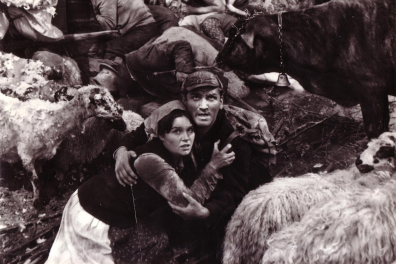
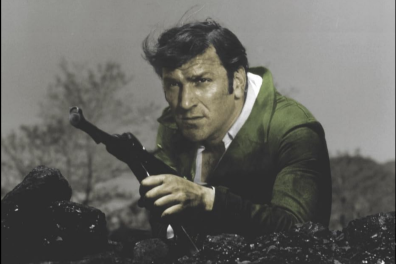
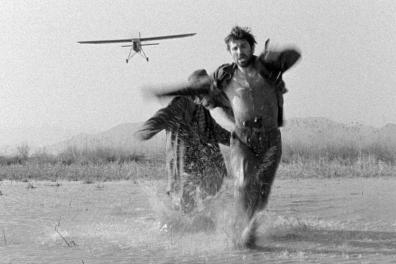
Friday, May 3, 2024 - 14:00 - 21:30
Yugoslav Partisans: historical figures and cinematic heroes (2nd edition)
Three-film session introduced and commented by Naïma Berkane (Sorbonne Université)
Heroes of the War of National Liberation, the Partisans were celebrated in socialist Yugoslavia and a whole visual culture was attached to them. The inaugural act of post-war Yugoslav cinematography, Slavica, is a film glorifying Communist resistance against the occupiers that gives rise to a specific and prolific genre, ranging from socialist realism to westerns or spy films: "partisan cinema". We propose to observe some of its variations through three films produced in the 1960s and 1970s, during the second cinematic modernism.